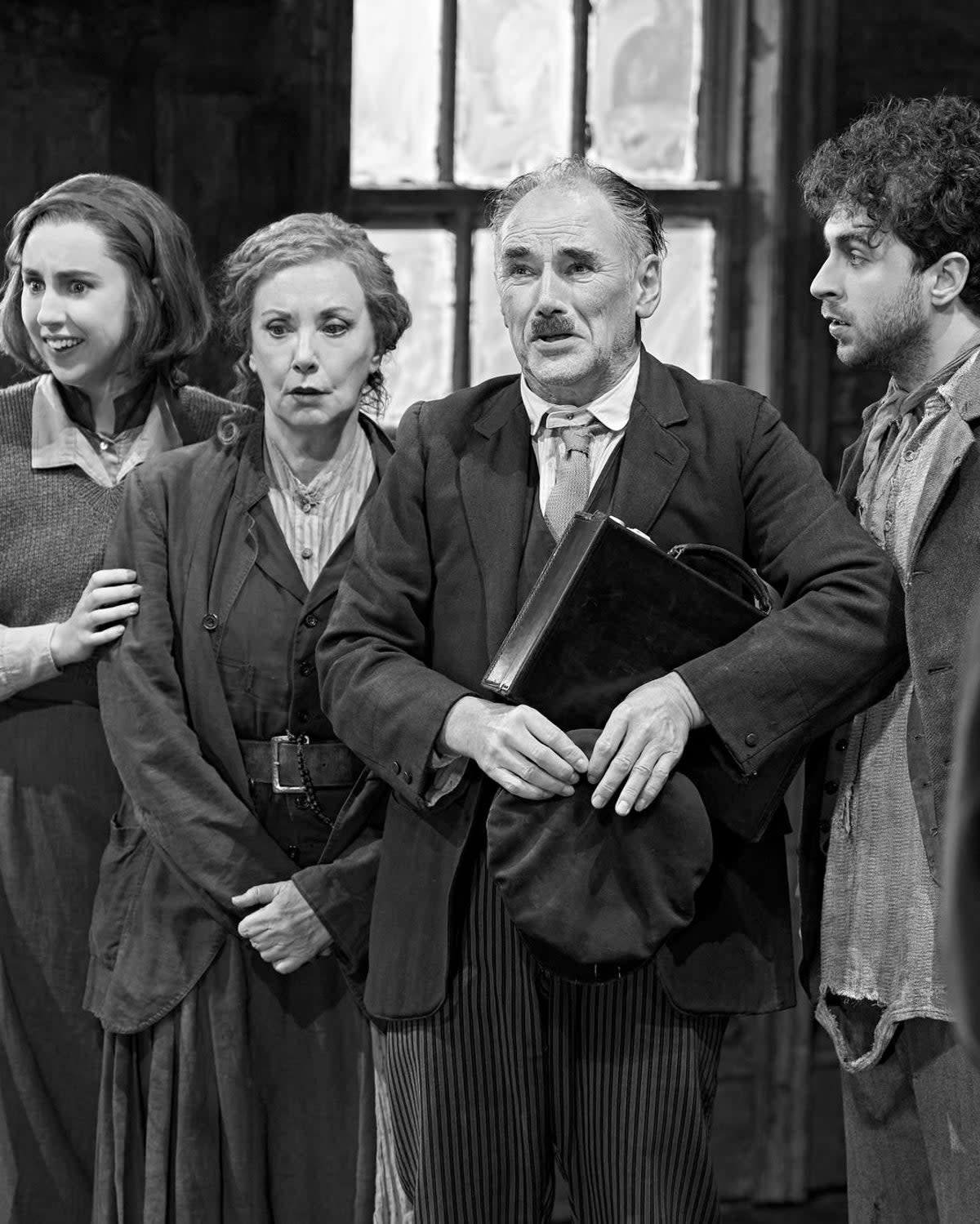Juno and the Paycock at the Gielgud Theatre review: Succession star J. Smith-Cameron is splendid

First things first: Sean O’Casey’s tragicomedy set in civil war-torn Dublin in 1922 has dated badly; Succession star J. Smith-Cameron is splendid in it as tenement matriarch Juno; Mark Rylance, a quicksilver but collegiate actor at his excellent best, sadly continues his recent slide into mannered self-parody as Juno’s feckless husband ‘Captain’ Jack Boyle.
The play was radical in its time, depicting the battle for Irish independence through working-class lives. Today its juxtaposition of broad humour with sectarian violence and poverty jars, as do the thick-as-stout accents.
Director Matthew Warchus accentuates the strangeness by giving his production the veneer of a black-and-white slapstick film, the cast in white pancake makeup and kohl-rimmed eyes. Rylance even sports a toothbrush moustache like Charlie Chaplin, Oliver Hardy or, um, Hitler.
His drunkenly slurring performance is as broad as his ‘tache is narrow. Captain Jack is a workshy, vainglorious "paycock” (peacock) of a man, spinning endless tales of a nonexistent seafaring career in pub snugs to his mate Joxer (Paul Hilton, uncomfortably miscast).
Jack has a tendency to mutter asides to himself or to the Almighty, represented by a crucifix hung over the forestage. Rylance therefore treats the role as an extended in-joke between him and the audience, full of familiar tics: the side-eyed bravado, the abashed shiftiness, the guilty stutter. It’s entertaining, but strangely selfish towards his fellow cast members.
Smith-Cameron, meanwhile, convinces utterly as Juno, who is single-handedly keeping from penury her useless husband, a radical daughter who’s on strike, and a son maimed in the independence struggle.
Although the character often switches improbably from rage to docility, Smith-Cameron – a Broadway veteran before she became the mighty Gerri in Succession – maintains a steely, beady inner truth. You can’t take your eyes off her, even when the focus inevitably reverts to Rylance.
Jack, already ridiculous, becomes even more preeningly absurd when he hears of a possible inheritance from the smooth Bentham, a schoolteacher and theosophist (the discussion of Bentham’s beliefs has also aged like milk).
Young Mary Boyle (Aisling Kearns, strong) foolishly chooses Bentham over her comrade Jerry Devine, while her brother Johnny’s fear of reprisals from his IRA comrades ramps up. Oppression, religion, politics and poverty conspire to destroy them. Like Joyce, O’Casey sees Ireland as an old sow that eats its young.
But though the play has historic value and potent moments it feels hopelessly over the top in this staging. The comic locals who initially interrupt the action are increasingly augmented by dour gunmen and grieving mothers.
The interludes of song are frankly bizarre. In the third act, Rob Howell’s impressionistic tenement set is torn apart to reveal a massive marble pieta, Mary mourning the dead Christ. Rylance hurls everything from the bannisters to the floorboards at Jack’s final appearance.
I wish Warchus had reined him in. And perhaps found a less rickety star vehicle to ferry Gerri – sorry, the theatrical grandmistress J – into the West End, great though it is to have her here. She shines – and outshines Rylance.
Gielgud Theatre, to November 23; book tickets here


